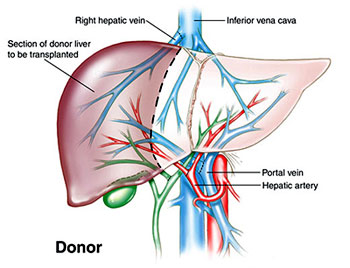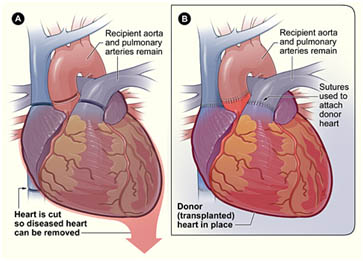Cadaveric Donor (deceased donor) Liver Transplant in india
 The waiting time can be very variable from 1 to 12 months depending on your blood group and your waiting list number. While waiting, if you are not available at your usual numbers, you must inform the Transplant Team of your whereabouts at all times so that they can contact you as soon as an organ becomes available.It is good idea to have a suitcase already packed with essential toiletry and underwear at home so that no time is wasted before you go to the hospital.
The waiting time can be very variable from 1 to 12 months depending on your blood group and your waiting list number. While waiting, if you are not available at your usual numbers, you must inform the Transplant Team of your whereabouts at all times so that they can contact you as soon as an organ becomes available.It is good idea to have a suitcase already packed with essential toiletry and underwear at home so that no time is wasted before you go to the hospital.
When is a Liver Transplant needed?
Liver transplantation is considered when the liver no longer functions adequately (liver failure). A potential cause of liver failure is a sudden (acute) failure from infection or complications from certain medications.
Long-term liver failure is more common and can be a result of the following conditions:
- Chronic hepatitis
- Primary biliary cirrhosis– a rare condition in which the immune system inappropriately attacks and destroys the bile ducts, causing liver failure.
- Sclerosing cholangitis– scarring and narrowing of the bile ducts inside and outside of the liver. This results in backup of bile in the liver and liver failure.
- Biliary atresia– malformation of the bile ducts. (This is a common reason for transplant in children.)
- Alcoholism
- Wilson’s disease– a rare inherited disease with abnormal deposition of copper throughout the body, including the liver, causing it to fail.
- Hemochromatosis (iron overload disease)– a common inherited disease in which the body is overwhelmed with iron.
- Amyloidosis– the liver has abnormal deposits of an abnormal protein called amyloid that disrupts normal liver function.
- Liver cancer
How are candidates for liver transplant determined?
Evaluations by specialists from a variety of fields are needed to determine if transplantation is appropriate. The evaluation includes a review of your medical/surgical/psycho-social history and a variety of tests. Many health care facilities offer an interdisciplinary approach to evaluate and select candidates for liver transplantation.
This interdisciplinary health care team may include the following professionals:
- Liver specialist (hepatologist)
- Transplant surgeons
- Transplant coordinator, usually a registered nurse who specializes in the care of liver transplant patients. This person will be your primary contact with the transplant team.
- Social worker to discuss your support network of family and friends, employment history, and financial needs
- Psychiatrist to help you deal with issues, such as anxiety and depression, which may accompany the liver transplantation
- Anesthesiologist to discuss potential anesthesia risks
- Chemical dependency specialist to aid those with history of alcohol or drug abuse
- Financial counselor to act as a liaison between a patient and his or her insurance companies.
Which tests are required before getting a liver transplant?
You will need to bring all of your previous medical records, X-rays, liver biopsy slides, operative reports and a record of medications to your pre-evaluation. To complement and to update previous tests, some or all of the following diagnostic studies are generally performed during your evaluation. If specific problems are identified, additional tests may be ordered.
- Computed tomography, which uses X-rays and a computer to generate pictures of the liver, showing its size and shape
- Doppler ultrasound to determine if the blood vessels to and from your liver are open
- Echocardiogram and stress testing to help evaluate your heart
- Pulmonary function studies to determine your lungs’ ability to exchange oxygen and carbon dioxide
- Blood tests to determine blood type, clotting ability, and biochemical status of blood, and to gauge liver function. Serology screening is also included.
Preparing for Surgery in India
The Operation in india
The transplant involves a major operation to remove the diseased liver and replace it with a normal donor liver placed in its usual position in the right upper abdomen. While this may sound relatively easy, the surgery is very demanding and can take between six and eighteen hours to complete. At least three surgeons, two anaesthetists, and half a dozen nurses are needed during the operation. The diseased liver must be disconnected from four major blood vessels and the tube that carries bile from the liver to the intestines, known as the bile duct, has to be disconnected from the bowel. The new liver is then put in place, and the major blood vessels and bile duct reattached to complete the operation.
After the operation in india
After the operation you will be taken to the intensive care unit and connected to a respirator (breathing machine). If all goes well, the respirator can gradually be phased out over 24-48 hours, although it is not unusual to require the respirator for longer periods of time.
After three to ten days in intensive care, you will probably spend another two to four weeks convalescing in the transplant unit before being allowed to go home. It is important that you try to get up and about as soon possible so that blood circulatory problems can be avoided.
Since the donor liver is foreign to the body, the body mounts an immune response to reject it. This is prevented by certain medicines referred to as immunosuppressive drugs.



